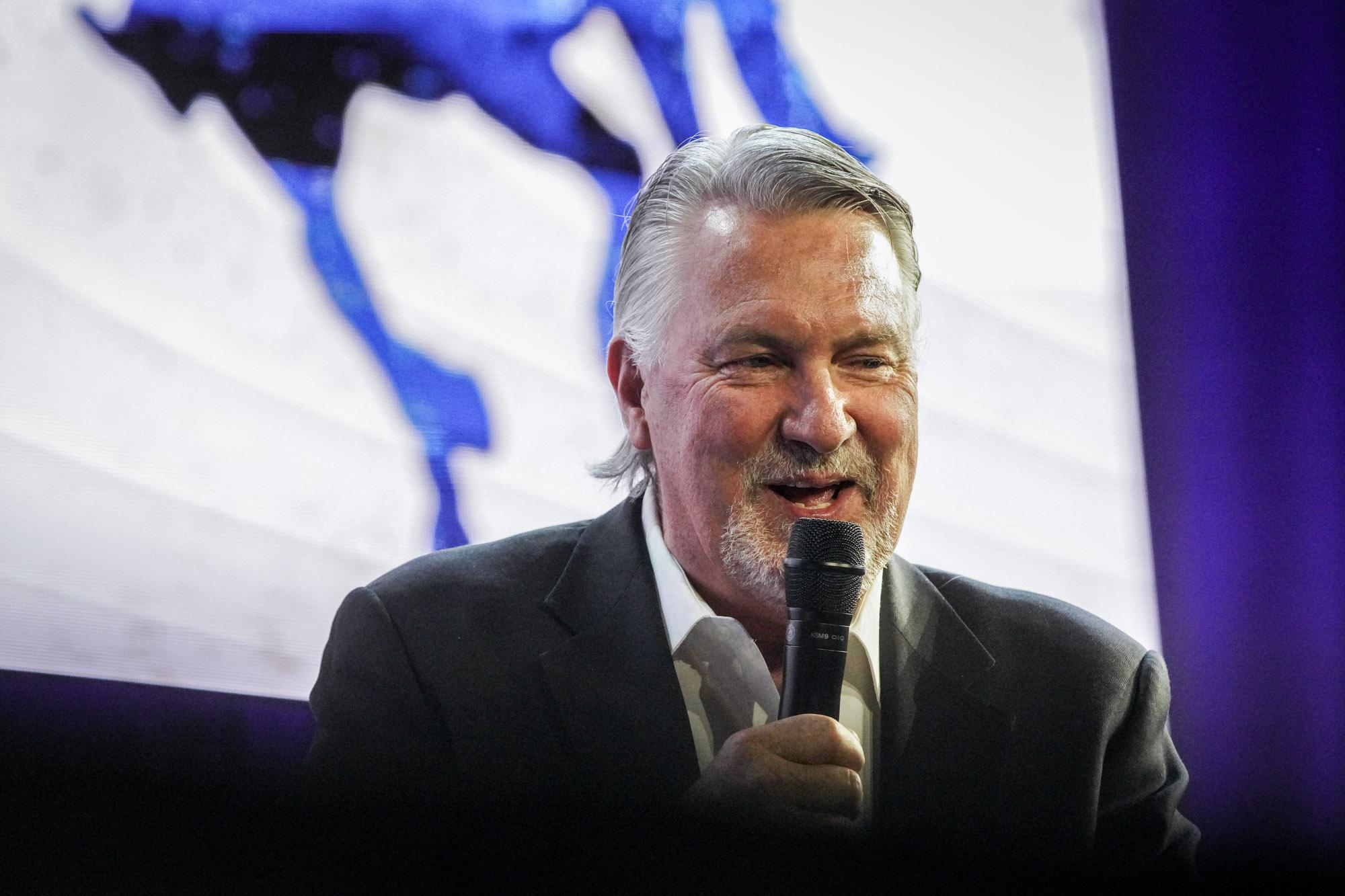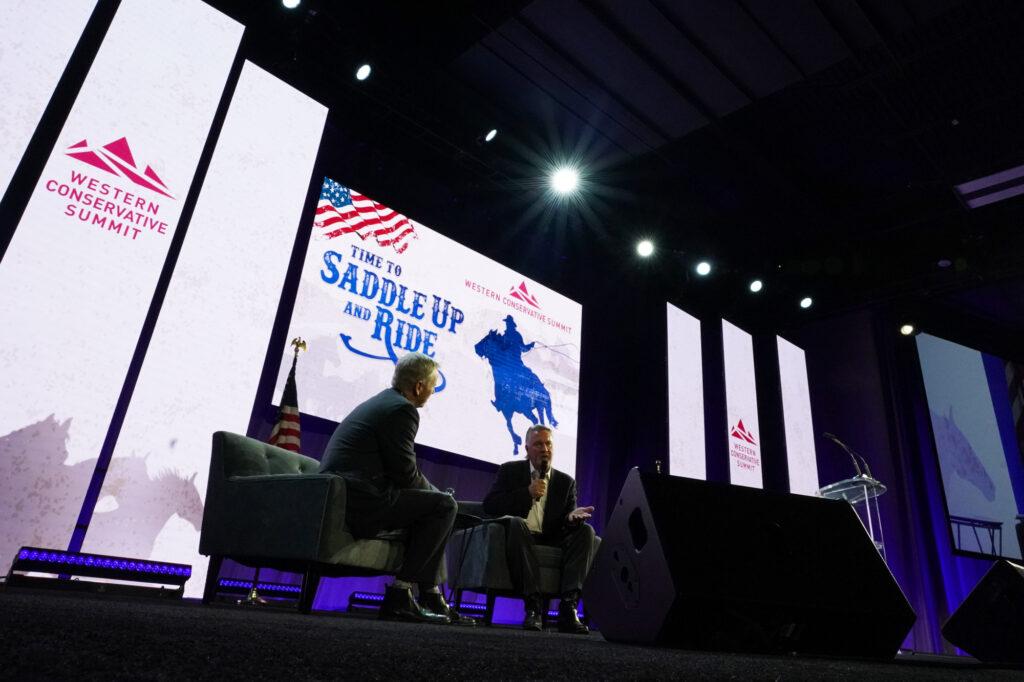
Joe O’Dea loves to ride horses. Up until recently, he rode competitively in the Team Penning event, working with two other riders to sort numbered cattle and “put them up” in order and as fast as possible.
Over the course of about a dozen years of competing in this event, he racked up three U.S. Team Penning Associating world titles, the most recent from 2018. His wife, Celeste, also used to ride on a women’s team.
“We have a lot of fun, it gives us a good time together,” O’Dea said. But these days the couple is focused on another competition where they hope to come out on top: Colorado’s race for the U.S. Senate. O’Dea is one of two candidates in the GOP primary, both hoping to go up against Democratic incumbent Sen. Michael Bennet this November.
Competing in a rodeo-type event might not seem to have a lot in common with politics, but O’Dea said many of the things he learned on a horse are coming in handy now: “How to be competitive, how to understand what you need to do next, and how to build a team.”
O’Dea, 60, was adopted as a newborn and raised in southeast Denver by a police officer father and a stay-at-home mom. O’Dea said growing up his family wasn’t particularly political — he didn’t go with his parents to the polling place or ever canvas for a candidate.
Instead, much of his adult life has been focused on business. O’Dea attended Colorado State University but eventually dropped out to instead focus full-time on a construction company he started while a student. 34 years later, that company, Concrete Express, now employs about 300 people. It’s headquartered in Mile High Station, an event venue O’Dea owns near Empower Field.
It was the construction industry that eventually drew O’Dea to politics.
“The first time I was really involved — I went to a legislative meeting for the Colorado Contractors Association back in about 1996,” the first time candidate recalled. “So I started getting into, how’s this going to affect my business? It was a very good learning experience.”
It’s this business perspective that O’Dea — who is pitching himself to voters as a political outsider — said he wants to bring to what he described as a “broken” Washington, D.C.
“They’re not addressing the needs of working Americans. And, if they are, they’re pretty slow to react,” O’Dea said. “I love this country and we need representation that can say ‘enough is enough.’ And that’s what they’re getting when they elect me.”
If elected, O’Dea would be the first person Colorado has sent to the Senate without any prior government or legislative experience since Eugene Milliken in the 1940s. (Bennet had not held any previous elected office when he was appointed in 2010, but worked as Superintendent of Denver Public Schools and served as chief of staff for two years to then-Mayor John Hickenlooper.)
Social issues vs. kitchen table concerns

Politically, O’Dea has focused his campaign on kitchen table issues: inflation, rising gas prices and crime.
And he’s trying to make the case that, as Senator, his business background and his working class roots would help him get things done on those problems.
“I can tell you that nothing gets done unless two parties can come to an agreement,” said O’Dea. “And so I'll take those skills, and I'm gonna use them in Washington to convince people that ‘here, I've got some ideas on how we do this.’ I'll listen. I'm a very good listener. You need to be respectful as well.”
While a willingness to compromise might be high on the list of traits some general election voters are seeking, “fighter” tends to be a more popular adjective with many Republican primary voters, especially when it comes to more divisive issues, such as the validity of the 2020 presidential election and abortion.
In his campaign, O’Dea has tried to walk a fine line, attempting to not alienate base voters, while still holding positions that could help him appeal to the wider electorate.
At a candidate forum earlier this year, O’Dea told the audience he does not believe the election was stolen and “Joe Biden’s our president. He’s a lousy president.” He said instead of focusing on 2020, the GOP needs to “stay to the issues.”
With the Supreme Court apparently poised to overturn Roe v. Wade, a long held goal of conservatives, O’Dea holds a less stringent position on abortion than many GOP candidates. He’s said it should be legal early in pregnancy and would also allow it for certain medical emergencies. It’s an acknowledgement that Colorado voters have supported abortion access on the ballot and at the statehouse for several years.
O’Dea said not everyone will agree on every issue. “I know my position on abortion isn’t the same as your’s,” he told an audience at the Western Conservative Summit, “but we share the common goal. I support an end to elective late term abortion nationally, an end to taxpayer funded abortion nationally, a parental notification requirement nationally.”
Those positions are very much at odds with Ron Hanks, the firebrand state representative O’Dea faces in the primary. Hanks is trying to argue he is the conservative choice: supporting Trump policies, saying the 2020 election was stolen, and opposing all legal abortion, with no exceptions.
Hanks’s stances received far more applause from the conservative attendees at the Western summit than O’Dea’s. Still, the lack of enthusiasm from the base is not discouraging O’Dea supporters.
“I like the conservative approach,” said Dave Harberson, an unaffiliated voter from Wheat Ridge, who usually votes Republican. “Joe has always… made good decisions, and [he’s] a patriot. So hell yeah, I’m going to support him.”
O’Dea thinks, in the end, it’s the issues he’s focused on — inflation, gas, crime — that will drive voters in the Republican primary, and the general election.
“We got a lot of issues here in Colorado that people want to address,” he said. And while he knows that some people want to focus on social issues, “Most people want to talk about how we’re going to fix this economy.”
Despite his relatively moderate tone, and past donations to candidates from both parties, O’Dea said he’s always been a Republican, starting with his first vote for Ronald Reagan. And he argues that he is truly a conservative. For him that means believing in a “small, efficient government” that does the basic things “we need it to do, that it was designed to do.”
That list would include police and the military and providing infrastructure, as well as a more limited social safety net.
O’Dea said he believes the government should help with medical care for those who can’t otherwise afford it, but not more general or permanent support. “To pay people to sit at the house and not work, that’s not my idea of welfare.” Many of the largest social safety net programs, such as food stamps or TANF, the current incarnation of welfare, have work requirements to access them.
On Bennet’s signature issue — expanding the Child Tax Credit — O’Dea said he supports the idea, but only for households with lower incomes. Under the pandemic expansion of the credit the amount of the credit increased and families could get it monthly. Families making up to $150,000 or single filters making up to $75,000 could claim the full child tax credit. It phased out after that.
And while O’Dea said his company offers paid family and medical leave, when it comes to whether Congress should institute a policy nationally, “I don’t know that we want to make that a permanent thing.”
As for the sharp rise in inflation, he sees it as a result of government spending and the Federal Reserve being “asleep at the wheel.”
“We need to cut big government back. We need to return our spending levels to pre-COVID. There’s no reason to keep some of these programs in place for COVID,” O’Dea said.
The electability factor
With the primary looming, many are looking down the road to November and which candidate might have the best chance of beating Bennet. Voters haven’t elected a Republican to a major statewide office since 2014, but the political headwinds strongly favor the party this fall.
“I think Joe has the best chance to do that,” said Republican Chuck Williams from Littleton. He believes O’Dea will reach across party lines. “I think it will really resonate with more than just Republicans, and that's important to me.”
For voters like Williams, electability may be the ultimate deciding factor, rather than the exact policy positions of either Republican candidate.
Some Democratic aligned groups appear to be concerned about that too; in recent days they’ve poured millions into ads and mailers aimed at boosting Hanks and weakening O’Dea in the primary. The O’Dea campaign has filed a complaint with the Federal Election Commission against one group it says has failed to include proper disclosures on its mailers.
O’Dea is putting a lot of his own money on the line for this run. He’s plowed more than $640,000 into his campaign and loaned the campaign $500,000, while raising almost $1.2 million from donors. As of June 8, he had about $1 million cash on hand. Bennet, who does not face a primary challenger, goes into the general election with nearly $7 million cash on hand.








